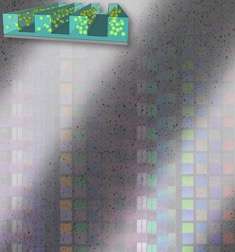Controlling the organization of nanoparticles into patterns in ultrathin polymer films can be accomplished with entropy instead of chemistry, according to a discovery by Dr. Alamgir Karim, UA’s Goodyear Tire and Rubber Company Professor of Polymer Engineering, and his student Dr. Ren Zhang. Polymer thin films are used in a variety of technological applications, for example paints, lubricants, and adhesives. Karim and Zhang have developed an original method—soft-confinement pattern-induced nanoparticle segregation (SCPINS)—to fabricate polymer nanocomposite thin films with well-controlled nanoparticle organization on a submicron scale. This new method uniquely controls the organization of any kind of nanoparticles into patterns in those films, which may be useful for applications involving sensors, nanowire circuitry or diffraction gratings, with proper subsequent processing steps like thermal or UV sintering, that are likely required but the self-organization into directed patterns.
This work, “Entropy-driven segregation of polymer -grafted nanoparticles under confinement,” has been published in the February 2017 issue of Proceedings of the National Academy of Sciences (PNAS).
Intuitively, entropy is associated with disorder of a system. However, for colloidal matter, it has been shown that a system can experience transitions which increase both entropy and visible order. Inspired by this observation, Karim and Zhang investigated the role of entropy in directed organization of polymer-grafted nanoparticles (PGNPs) in polymer thin films. By simply imprinting the blend films into patterned mesa-trench regions, nanoparticles are spontaneously enriched within mesas, forming patterned microdomain structures which coincide with the topographic pattern. This selective segregation of PGNPs is induced by entropic penalty due to the alteration of the grafted chain conformation when confined in ultrathin trench regions.
